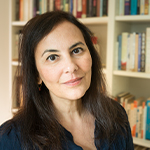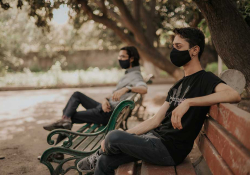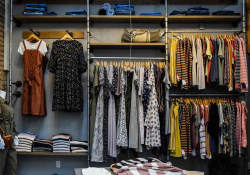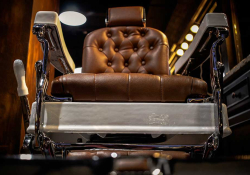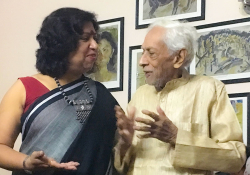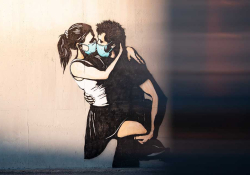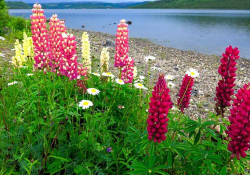Pandemic Invasion: Reflections from Kuwait
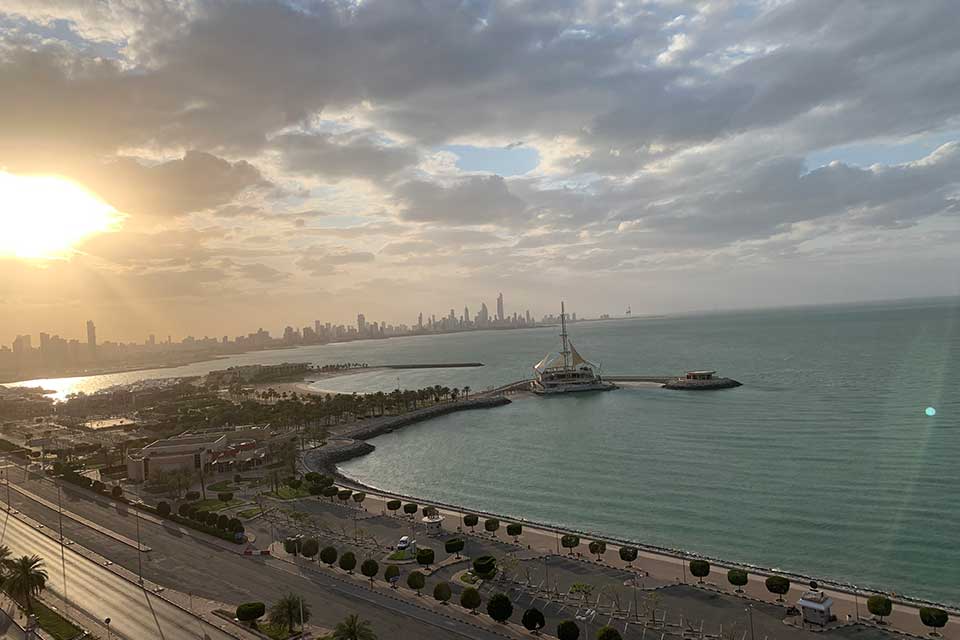
Reflecting on the invasion of Kuwait in 1990 and the current pandemic, the author writes about wanting “to grab the future with both hands, to sing about survival, to believe, like my father did, that Kuwait is worth rebuilding from scratch.”
In August 1990, when Iraq invaded Kuwait, my father was forty-seven years old. It was a crisis that shook him to the core. This April 2020, in the fire of Covid-19, he is seventy-seven and not in the best of health, one of the vulnerable elderly. When I ask him which seems worse, the invasion or this virus, he answers without hesitation, “The virus.” My father dedicated his life to the practice of medicine, yet this virus scares him. “We don’t know what it can do.” If I could ask my mother which felt worse, the invasion or the virus, I’m certain she would say the invasion. But I can’t ask her because she died of lung cancer far too young, an effect, I am convinced, of the burning oil wells Saddam Hussein’s army left in its wake. I was nineteen that year. In the midst of this pandemic, I’m forty-nine, slightly older than my parents were during the invasion. I’m beginning to suspect that for Kuwait, the invasion and this pandemic are two sides of the same coin, the way I have become the flip side of my parents.
I’m beginning to suspect that for Kuwait, the invasion and this pandemic are two sides of the same coin, the way I have become the flip side of my parents.
In 1990 my father didn’t seem to doubt that Kuwait would eventually be liberated. His mind was preoccupied by what it would take to rebuild the medical infrastructure of his country, an infrastructure he had spent the first half of his life establishing. But my father, always planning for the worst scenario, also prepared to take the medical board of California’s licensing examination, just in case we were forced to settle in the United States, which is where we happened to be on the second of August that year. He applied for jobs in Bahrain and the UAE—again, just in case. All the while positive, or so he now claims, that these alternate plans would not be necessary, that Kuwait would soon be free.
I remember more uncertainty. I remember CNN blasting twenty-four hours a day, my father huddled in front of the television, despairing when any US congressman criticized President George H. Bush’s plan to force Saddam out. “Just wait, watch, and learn,” Bush declared days after the invasion. “This will not stand, this aggression against Kuwait.” Those words became my father’s lifeline. But Kuwait’s liberation by military intervention was not a given. Allies had to be rallied, our closest neighbors needing the most persuasion. The ultimate triumph may have dulled my father’s recollection of those anxious months of anticipating disaster. But I remember, and it matches the uncertainty we feel today in relation to the virus.
Even still, like my father, my memory of the invasion also seems less bleak than the reality of this pandemic. It could be because I wasn’t in Kuwait at the time. It could also be because two of my three sisters were with me then. Today one sister is in California. We don’t know when we’ll see each other again. The other two, like me, are in Kuwait, but we are all in self-isolation, with no end in sight. If my mother were alive today, together with my father in our childhood home, he probably wouldn’t be experiencing this virus as the worst event in recent history. At least during the invasion, we still had her.
In California that year, I would drive my sisters to school every morning. On the way I would stop at a mom-and-pop restaurant that sold the best donuts we had ever tasted in our lives. After dropping them off, I would head to a community college where I was registered for classes I hoped would transfer to Kuwait University once we returned. That we would return felt less assured to me than it did to my father. So like him, just in case, I made plans to apply to the University of California at Irvine. Around three each afternoon, I would collect my sisters from school and drive home. We listened to the oldies station on the radio, singing at the tops of our lungs to the Grateful Dead’s “Touch of Grey.” In those moments, the invasion did not feel like the end of the world.
Our oldest sister was trapped in Kuwait with her husband and children, one of whom was born only two weeks before the invasion. They were there for the duration. When I ask my sister which feels worse, the invasion or this pandemic, she responds, also without any hesitation, “The invasion.” When I ask why, she says, “We’re not hearing bombs going off around us. We’re not worried soldiers will barge in at any moment.” What she and those inside the country during the invasion went through was not at all like what those of us on the outside did; but neither side has fully reckoned with the trauma. We all wanted to put it behind us as fast as possible, to get on with reconstruction and the future. I think that’s how my father felt about it. My older sister as well. Maybe that shared desire is what brought the two sides together. In 1991 Kuwait could afford to rebuild its future, even with the colossal expense of the war effort. 2020 is different. The collapse is global, and oil isn’t worth much these days. This time, without massive economic and social restructuring—on a scale and level of complexity that exceeds the transformation that took Kuwait from sea-faring to oil-producing—I don’t think we’ll make it.
For my mother, the invasion was an emotional sledgehammer. Her own mother was stuck in Kuwait, as were most of her siblings. Her oldest daughter, as I mentioned, was inside, as were her three grandchildren. My sisters, eleven and fourteen at the time, remember our mother sitting us down the day after the invasion and telling us to forget the life we once knew, that it was gone forever. I don’t remember that moment, but my sisters assure me it happened. What I do remember is my father promising he would take care of us, saying he had money saved up, that we would eat and continue our education.
At nineteen I was able sometimes to push my parents’ sorrow and the loss of my country to one side. My life was not under immediate threat. Whatever the outcome of the invasion, for myself and my younger sisters, the future remained open. My father had made a promise, and he was as good as his word. To eat and to study was enough of a future, and my sisters and I grabbed it with both hands, clinging to shared moments of lightness, singing in the car, scarfing down donuts, studying and enjoying it, finding beauty in the yellow and purple flowers that bloomed across the hills after a rain shower, even falling in love, as the young always manage to do. No doubt it was different for us than it was for those living under direct occupation or even for my parents, whose middle-aged futures could not have felt as wide open as ours. Despite the few hours of freedom my sisters and I captured for ourselves, all it took was the look on our parents’ faces to thrust us back into the fragility of everything.

What I feel these days is that same fragility, without the promise of youth, without my sisters close, without my mother, without the reassurances of my father, whose well-being I must do everything to preserve as he once did ours. I am the caregiver now, and I find myself offering assurances I am in no position to give. “You’ll be okay, Dad. You’re safe in your home.” I keep six feet apart; I wear gloves and masks to and from my apartment and his house. I visit because I worry that loneliness could prove as deadly as the virus. But this fucking virus is always on my mind. That I might inadvertently kill my father is a fear I live with every day. Nothing like this knife’s edge existed for us during the invasion.
After liberation, my father was on one of the first government planes heading into the country. It was early March 1991. His task was clear, and he set to it with gusto. My father is at his best in action. He isn’t cut out for repose, which is why self-isolation and curfew—to say nothing of retirement—is for him a form of torture. I’m different. I ponder and pace. I ruminate and muse. The deceleration of self-isolation and curfew feels familiar. It’s a measure I miss when caught up in daily directives. I wonder whether the suspension of the invasion made me this way or if it’s the way I’ve always been, the ancestral rhythm of desert and sea in my genes. As a child growing up in Kuwait, time belonged to me. It was filled with books, writing, music, solitary adventures, and friendships that still mean everything. The invasion intensified this sense of slowness. The virus does so again, and it feels utterly necessary.
I wonder whether the suspension of the invasion made me this way or if it’s the way I’ve always been, the ancestral rhythm of desert and sea in my genes.
Back in Kuwait in early September 1991, attending university once more, I felt differently. Nothing could move fast enough. It was a clean slate we were returning to, and I wanted that slate filled with the bright idealisms of youth. Oil wells were burning, filling our skies with soot. It had been for oil that Kuwait was invaded and for oil that it was liberated. This was our chance to push away from it. We had been humbled, brought low. We should rise with grace, do the dirty work of living for ourselves, not contract it out to exploited labor from Egypt or South Asia. We had been liberated from tyranny. So now we should have a real democracy, a functioning parliament, equal rights for women and the bidoun (stateless), opportunities based on merit, not wasta (clout). I wanted freedom, and a few fellow students did too. We were in the minority—self-righteous and no doubt insufferable—but we weren’t wrong.
A grizzled British professor visiting Kuwait University that year slammed our starry-eyed aspirations. “Nothing will change,” he said. “Everything will go back exactly as it was.” We scoffed at his pessimism. What did he know? It would be different for Kuwait. We would make sure of it. But we didn’t. We failed, and spectacularly, on many fronts. The public education system is archaic and rigid. The health-care system is overburdened and inconsistent. Resistance to diversifying away from oil has landed both the economy and the environment in crisis. The demographic imbalance that existed before the invasion has increased, with resident noncitizens making up 70 percent of a population of 4.26 million. Many are victims of human trafficking by Kuwaitis thanks to a corrupt kefala (sponsorship) system, which enables the illegal sale of resident visas. Culturally, with relatively vibrant art and literary scenes and the recent opening of two dynamic cultural centers, we’ve done better. There may be a scrap of hope to be gleaned from that. But “better” in this context includes the banning of over four thousand books by the Ministry of Information over the last five years. It’s important to keep our hopes grounded in reality.
Has the invasion prepared Kuwait for this pandemic? In some ways, yes. There are many things Kuwait is doing right. In March, the government jumped into action. It closed the international airport, schools and universities, public-sector jobs (with paid leave), most bank branches and private-sector businesses, and it banned public gatherings. It displayed transparency in reporting cases and deaths. It seemed to test and trace. It quarantined some individuals institutionally and others in their homes. It initiated a partial curfew. It quarantined certain areas with a high incidence of cases, areas where mostly migrant labor reside. This is where the quality of action gets murky.
Some of the mistakes of the postinvasion period will be repeated, alas, and new mistakes will be made. Mainly these will have to do with restructuring the economy, addressing social inequalities, and modifying demographic imbalances. There are calls for Kuwaiti human traffickers to be brought to justice, no matter where in the hierarchy they rank. Whether or not that comes to pass, we’ll have to wait and see. As for the economy, alarm sirens are wailing, from plummeting oil prices to IMF warnings that the country will go bankrupt in the span of five to seven years as a direct result of unproductive public-sector spending. Yet the sacrificial lamb in this crisis is not the vastly overbloated public sector but the private sector, small businesses in particular.
One such small business is the beauty salon my mother established in 1979 and passed down to me and my sisters when she died. Since 2001 I have been running the business I still think of as my mother’s. Some of our employees, all of them Indian nationals, have been working at the salon since it opened. That’s forty-one years. Many of these women are like family to me and my sisters. They’ve known us since we were kids. Without robust financial support from the government, I won’t be able to sustain the business my mother established. I won’t be able to pay the exorbitant rent, another form of unchecked exploitation in this rentier state. I won’t be able to pay the salaries of our employees, who support their families, who won’t be able to pay their own rent in a country that will never grant them citizenship no matter how many years of their lives they spend here.
During the invasion, the salon was closed, but our employees were able to evacuate Kuwait with the help of their government. Today, with canceled flights and governments reluctant to repatriate nationals by the millions, leaving isn’t an option. After the invasion, my mother could reopen her business quickly because rents weren’t high and the government was doing everything to win back the support of its citizens, including facilitating the return of qualified employees from all over the globe. Without any just reform strategies introduced to manage population growth or to curtail the greed of those taking advantage of the unethical kefala system, it didn’t take long for the demographic imbalance to recur, for reasons having nothing to do with legitimate businesses like my mother’s or the resident noncitizens themselves.
Many resident noncitizens work in the private sector owned by Kuwaitis, offering services to Kuwaitis, paying rent on properties owned by Kuwaitis, spending money in Kuwait. Racist calls for mass deportations or to allow the private sector to crash because it only benefits non-Kuwaitis miss the point entirely. Such actions would spark the kind of social and economic decline we should be fighting to prevent. There is a strong possibility that our family business, which survived the invasion and my mother’s death, may have to keep its doors shut permanently. The invasion killed my mother. This pandemic—and the lack of any decisive national fiscal response to it—will kill her legacy.
The invasion killed my mother. This pandemic—and the lack of any decisive national fiscal response to it—will kill her legacy.
There are solutions to these interconnected problems, but they are difficult and require up-front sacrifices on the part of the government and citizens. Whether the pandemic will force the country into this position is a question that cannot be answered yet. Denial is a powerful force. I remember my British professor’s words after the invasion, and they no longer strike me as outdated; they strike me as true. A cure for Covid-19 would not solve Kuwait’s problems. Our problems predate the virus. They predate the invasion by a decade or more. If we choose to learn from history and dare to imagine a radically different future, solutions exist.
I still want to prove my professor wrong, to soothe my aging father’s fears. I’m no longer young, but I still want to grab the future with both hands, to sing about survival, to believe, like my father did, that Kuwait is worth rebuilding from scratch. I want to hold tight to the last vestiges of my mother’s life. But this isn’t about me and my parents, at least not only. It is about vision, courage, and action. It is about preparing the conditions for a sustainable future while we still can. If this pandemic changes nothing, like the invasion changed nothing, this country is lost.
Kuwait City
